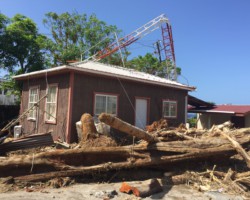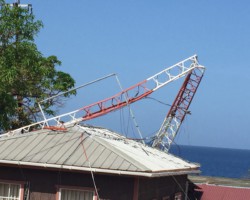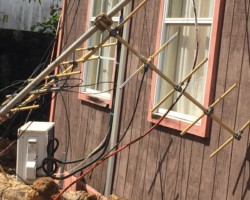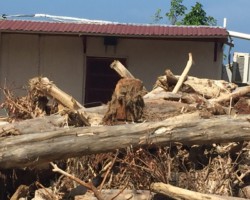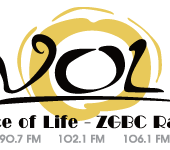In the year 1974, two foreign missionaries, Evangelist Bob Post and Wayne Nauman from Tulsa, Oklahoma in the USA, arrived on the island of Dominica on a two-pronged mission – to hold a crusade at the Jerazim Baptist Church which was at the time located on the river bank in Roseau and to seek an appropriate location for the construction of a Christian radio station.
From the several sites visited, one captured their attention greatly; it was a part of Stowe Estate belonging to Mr. Stanley Fadelle – a beautiful place on a hill top overlooking the Atlantic Ocean with a horizontal view of the French Island of Martinique and the village of Grand Bay to the south. Having received permission from the Government of that day and secured the sight for the radio station, the missionaries left Dominica with the intention of returning shortly to begin construction of the radio station.
A year later, in 1975, the missionaries, along with friends, returned to begin first with the road construction and soon after the sight was prepared for the construction of the radio station. Work progressed rapidly and in 1976 the radio station was ready and came on the airwaves on the frequency of 1060AM. Its voice was heard throughout the Eastern Caribbean and parts of Guyana. Letters began flowing in from listeners all over the Caribbean, expressing their joy at receiving a radio station of this nature in their homes.
The radio station was first named “Voice of Hope” by the first owners who thought the name appropriate because through the radio station the hope of salvation would come to the people of the Caribbean.
During the early years of the radio station, it was staffed by Evangelist Jim Vanheck, a Director, the founder of the First Cornerstone Baptist Church in St Joseph; Cecil Shillingford, Local Manager; Franklyn Francis, Secretary and Announcer; Henry Pascal and Philip Prosper – Announcers; Rumould Gregoire and others – Groundsmen/Watchmen.
The station began with limited resources which, like most start-up enterprises, created its own measure of setbacks; part of which was the inability to adequately compensate its staff. The announcers’ salary at the time was $150.00 per month! So what kept them at their jobs? – Their strong devotion to God’s ministry. The focus was the purpose of the mission – to bring the Word of Truth to the Caribbean people.
In 1978, a fire broke out at the radio station. The fire started at the transmitter equipment and within a few minutes the wooden structure, other equipment, furniture and other items were all destroyed, leaving only the concrete structure. This unfortunate situation did not however dampen the interest of the owners. They returned to the island with a team of helpers to rebuild what the fire had destroyed. Shortly afterward, in August 1979, Hurricane David struck the island and left behind massive destruction. The radio station lost its 460-foot antenna.
In both instances, station supporters responded with prayer, financial support and voluntary help. Young people canvassed neighboring islands and raised money, while an architect donated plans for the building. Individual churches sent teams of workers to help rebuild the station’s facilities and volunteers from Canada and the U.S.A. provided valuable engineering assistance as required.
However, in the wake of these mishaps and losses and their inability to continue financing the station, the owners of the station took the decision to relinquish ownership to the Back to God Hour Ministries. The new owners moved the on-air section of the station to rented space at the Sisserou Hotel. In the meantime, the current site in Madrelle, Loubiere was negotiated for and acquired. It was felt then that a change of name would be appropriate and the radio station became known as the “Voice of Life”, with a frequency change from 1060 to 740 on the AM band.
The Voice Of Life – ZGBC Radio became well known in the Eastern Caribbean as the Voice which brought peace and comfort to the hearts of its listeners. There was a constant flow of listener responses both locally and overseas. Then came the September 11, 2001 (“9/11”) terrorists attacks in the US & its resultant challenges which short-circuited the financial support from our North American partners. The decision was then taken to release three members of staff in order to lighten the financial burden. Despite this action, the fiscal position of the station did not improve and in January 2004 the AM frequency which was maintained at great expense was, of necessity, disabled. This action greatly affected the station’s listeners, particularly in the Eastern Caribbean, who were then and are currently no longer able to receive us on the airwaves.

